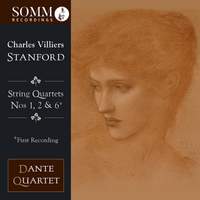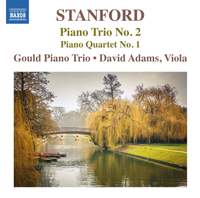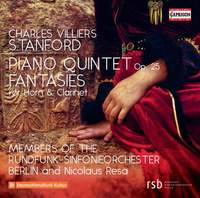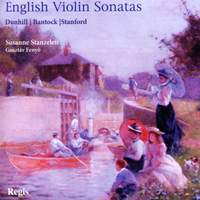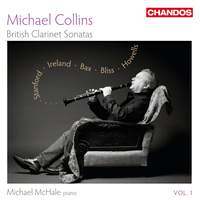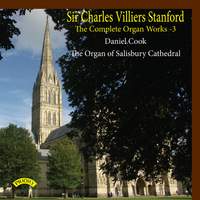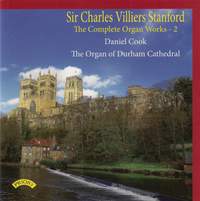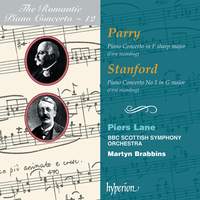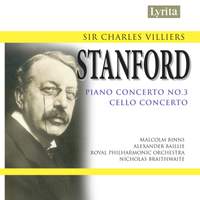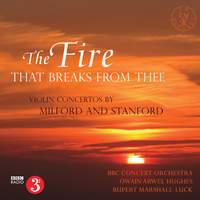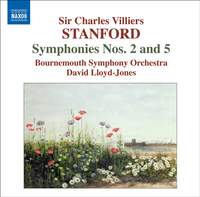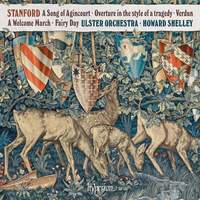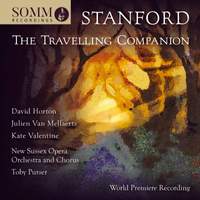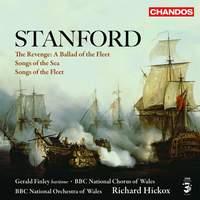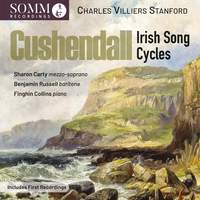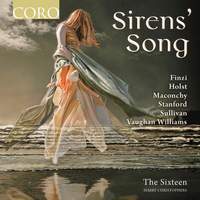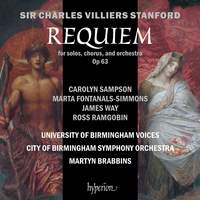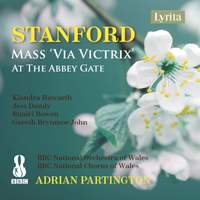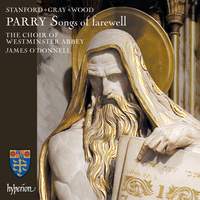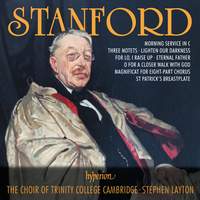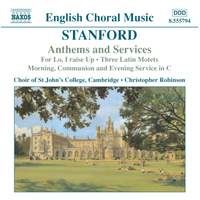Favourites,
Charles Villiers Stanford (1852-1924)

29th March sees the 100th anniversary of the death of the great Anglo-Irish composer , Charles Villiers Stanford. Long beloved of choristers for his tuneful, approachable sacred music - anthems, motets and evensong canticle settings - much of the rest of Stanford's music languished in relative obscurity for several decades after his death. Perhaps a victim of his comparative musical conservatism, and also the stellar career of his contemporary Edward Elgar, Stanford has nevertheless been undergoing something of a revival in recent decades, in terms of both academic appreciation and the availability of commercial recordings.
Born in Dublin (then part of the United Kingdom), Stanford showed early promise on the violin, piano and organ, and took up the post of organ scholar at Queens' College, Cambridge in 1870. Though he was in theory there to study Classics, his musical activities rapidly began to eclipse his studies, and he became a regular fixture of the university's Musical Society as both composer and pianist. Along the way, he quietly sidestepped the obstinate refusal of the Society's members to allow women to sing in its choir by starting up his own rival ensemble - quickly acclaimed as far superior and embarrassing the Society into a hasty rethink.
After finishing second from bottom in his year in Classics - to nobody's great surprise - Stanford was appointed organist at Trinity College, Cambridge, combining this (with his employers' blessing) with further studies at the Leipzig Conservatory. He did not get on well with his teacher Carl Reinecke; although Stanford himself would later acquire a certain skepticism of modernity, it was Reinecke's own conservatism in turn that he found challenging. A period spent studying with Friedrich Kiel in Berlin was more to his liking, and he returned to Cambridge shortly thereafter. By his mid-30s he had begun to make a serious name for himself in British musical circles, though his works of this period were not universally successful.
In 1883, Stanford was appointed as the first professor of composition at the newly-founded Royal College of Music - a post in which he would teach a host of notable composers including Coleridge-Taylor, Clarke, Bliss, Holst, Howells, Ireland and Vaughan Williams. He was, by all accounts, not an easy task-master, frequently offering his criticism or praise in a few short and unhelpful words; but above all he was uncompromising in holding his pupils' feet to the fire to keep them from 'slovenliness' or 'vulgarity'.

Although Elgar had not been among his pupils, Stanford had supported him in his career on many occasions; nevertheless, it was he who would eclipse Stanford in later years, with Elgar's reputation in Continental Europe particularly contributing to his rapid trajectory to prominence. Stanford - always somewhat quick-tempered though rarely inclined to truly bear a grudge - unavoidably began to feel sidelined and abandoned by musical tastes, which were moving on without him. With the idioms of Debussy, Ravel, Richard Strauss, Schoenberg and Stravinsky all likewise gaining traction, his style was being squeezed out from several directions at once. His reputation, however, was secured; he had sparked the fire of music in a generation of composers, he had revitalised the languishing standards in English church music, almost single-handedly setting the stage for its high level of achievement right up to the present day, and he had of course composed a huge number of works in the Brahmsian tradition he held so dear.
Of particular interest is the way in which Stanford bridges the gap between British and Irish identities, seeing no paradox at all in being both at once. A proud Irishman and passionate Unionist in the era of the Home Rule movement; sensitive to English stereotyping of the Irish yet fascinated by Romantic whimsical notions of Celticness; a flag-waver for the Empire on which the sun never set and a stalwart of the British establishment, particularly the Anglican church - his music embraces proudly and fully both his Irishness and his Britishness.
My thanks go to my friend and colleague Dr Paul Rodmell of the University of Birmingham (where he specialises in music in the British Isles in the later nineteenth century, particularly opera and church music) for his kind assistance with this article.


Charles Villiers Stanford (1852-1924)
Curated by David Smith
A selection of some of the best recordings of music by the Anglo-Irish composer - known particularly for his sacred choral music but also a prodigious composer of chamber and orchestral works, songs, part-songs and more. 8 hours 29 minutes
Charles Villiers Stanford (1852-1924) - a selection of great recordings of his music
'The Dante Quartet’s performances are superbly stylish and accurate; the First Quartet is led by second violinist Oscar Perks, who delivers every bit as impressively as leader Krysia Osostowicz...' (BBC Music Magazine, March 2020)
Available Formats: CD, MP3, FLAC, Hi-Res FLAC
'The relative smallness of piano trio repertory is partly due to the medium's balance difficulties...Such is Stanford's skill in the Piano Trio No. 2 that the problem seems not to exist...' (BBC Music Magazine, April 2015)
Available Formats: CD, MP3, FLAC, Hi-Res FLAC
'Forgive Stanford for steering uncannily close to Brahms and Schubert at times (think late-Romantic Trout), as his Piano Quintet is really rather lovely.' (BBC Music Magazine, August 2021)
Available Formats: CD, MP3, FLAC
'All three works are sure-fire audience pleasers...Stanzeleit and Fenyo are fine chamber musicians, and their performances here are praiseworthy indeed - proficient, communicative and persuasive.' (MusicWeb International, January 2012
Available Formats: MP3, FLAC
Michael Collins: British Clarinet Sonatas Volume 1
Michael Collins (clarinet) & Michael McHale (piano)
'Collins and McHale make a convincing case for these attractive scores. One senses that Collins is a sensitive musician. He certainly has impressive breath control and produces an attractive timbre...' (MusicWeb International, June 2012
Available Formats: CD, MP3, FLAC, Hi-Res FLAC
The Complete Organ Works of Charles Villiers Stanford, Vol. 3
Daniel Cook (the organ of Salisbury Cathedral)
'Daniel Cook’s survey encompasses his fourth Sonata which forms the centre point and the two sets of Preludes and Fugues completes this Volume. The booklet contains copious scholarly notes by the eminent Stanford author Dr Jeremy Dibble.'
Available Format: CD
The Complete Organ Works of Charles Villiers Stanford, Vol. 2
Daniel Cook (organ of Durham Cathedral)
'[Cook's] playing is never less than intelligent and involved in a well-recorded recital...' (Choir & Organ, May 2015)
Available Formats: CD, MP3, FLAC
The Romantic Piano Concerto 12 - Parry and Stanford
Piers Lane (piano), BBC Scottish Symphony Orchestra, Martyn Brabbins
'Stanford deliberately set out for his concerto to be of a bright and butterfly nature to contrast with the usual epic tradition of the late nineteenth century. Much to the composer's regret, the concerto was never published even though, as this recording bears out, it testifies to all that is distinctive, eloquent and craftsmanly in Stanford's instrumental work.'
Available Formats: CD, MP3, FLAC
Stanford: Piano Concerto No. 3 & Cello Concerto
Alexander Baillie (cello) & Malcolm Binns (piano), Royal Philharmonic Orchestra, Nicholas Braithwaite
'The Cello Concerto in D minor is an early work dating from 1879-80. Apart from the slow movement, the concerto was never performed and soon consigned to dusty oblivion by its creator. An endearing effort it proves, too, the solo writing always grateful and assured (the central Adagio displays a winsome lyrical charm reminiscent of Dvorák and Sullivan) and deftly scored, above all in the finale which trips along most engagingly. Alexander Baillie's impassioned and stylish advocacy could hardly be improved upon...' (Gramophone Classical Music Guide, 2010)
Available Formats: CD, MP3, FLAC
The Fire that Breaks from Thee
Rupert Marshall-Luck (violin), BBC Concert Orchestra, Owain Arwel Hughes
'[The Stanford] is a wonderfully fluent, warm-hearted creation...Dashingly committed treatment it enjoys, too, from Rupert Marshall-Luck, who receives uncommonly fine support from Owain Arwel Hughes at the helm of the BBC Concert Orchestra...Plaudits and gratitude to all concerned.' (Gramophone Magazine, November 2014)
Available Formats: CD, MP3, FLAC
'Both symphonies contain some attractive ideas, they're beautifully scored and carefully worked out, and they make enjoyable listening… David Lloyd-Jones certainly makes a strong case for both...' (BBC Music Magazine, November 2007)
Available Formats: CD, MP3, FLAC
'The variety of moods in these miscellanea, lovingly performed by the Ulster Orchestra and Howard Shelley in congenial sound, is one of its most attractive features…' (BBC Music Magazine, October 2019)
Available Formats: CD, MP3, FLAC, Hi-Res FLAC
Stanford: The Travelling Companion
David Horton, Julien Van Mellaerts, Kate Valentine, New Sussex Opera Orchestra and Chorus, Toby Purser
'It’s a very decent recorded operatic debut for Stanford, and enthusiasts – and the curious – are unlikely to be disappointed…[Purser] sounds like he’s been conducting Stanford operas for decades, so eloquent is his phrasing, and so naturally does he let the music blossom and soar.' (Gramophone Magazine, November 2019)
Available Formats: 2 CDs, MP3, FLAC, Hi-Res FLAC
Stanford: Songs of the Sea, The Revenge & Songs of the Fleet
Gerald Finley (baritone), BBC National Chorus of Wales & BBC National Orchestra of Wales, Richard Hickox
'Songs of the Sea - which includes the long-popular 'Drake's Drum' and 'The Old Superb' - and the later, texturally richer and more thoughtful Songs of the Fleet are superb baritone vehicles for Gerald Finley…' (BBC Music Magazine, July 2006)
Available Formats: SACD, MP3, FLAC, Hi-Res FLAC
Stanford: Cushendall, Irish Song Cycles
Sharon Carty (mezzo-soprano), Benjamin Russell (baritone), Finghin Collins (piano)
'Mezzo-soprano Sharon Carty and pianist Finghin Collins do this music proud...Boasting admirably truthful sound and balance to boot, this enterprising issue comes heartily recommended.' (Gramophone Magazine, March 2024)
Available Formats: CD, MP3, FLAC, Hi-Res FLAC, Hi-Res+ FLAC
'One would have to travel very far to find an album of British a cappella (mostly) music as beautifully sung as this...The Sixteen’s singing, like Mike Hatch’s recording, is as excellent as one would expect.' (Gramophone Magazine, October 2023)
Available Formats: CD, MP3, FLAC, Hi-Res FLAC
Stanford: Requiem
Carolyn Sampson (soprano), Marta Fontanals-Simmons (mezzo-soprano), James Way (tenor), Ross Ramgobin (baritone), University of Birmingham Voices, City of Birmingham Symphony Orchestra, Martyn Brabbins
'Brabbins, who truly understands the language of this music, judges the tempos and balance of the ensemble with instinctive sensitivity...For anyone interested in British choral music of the period, it is a must!' (Gramophone Magazine, June 2023
Available Formats: CD, MP3, FLAC, Hi-Res FLAC
Stanford: Mass 'Via Victrix' & At the Abbey Gate
Kiandra Howarth (soprano), Jess Dandy (contralto), Ruairi Bowen (tenor), Gareth Brynmor John (baritone), BBC National Chorus & Orchestra of Wales, Adrian Partington
'Rescued from obscurity nearly a century after its composition, Stanford’s large-scale post-war mass is definitely worth checking out. Impassioned performances here.' (BBC Music Magazine, September 2019)
Available Formats: CD, MP3, FLAC
Parry: Songs of Farewell & works by Stanford, Gray & Wood
George Purves (treble), Westminster Abbey Choir, James O’Donnell
'The ensemble rides that acoustic knowingly, using its echo and harbouring its resonance' (Gramophone Magazine, July 2020)
Available Formats: CD, MP3, FLAC, Hi-Res FLAC
'Stocked with female voices rather than boy trebles, the Trinity choir attack this repertoire with a brisk attack and mature aplomb under Stephen Layton’s sensitive direction. There is so much to cherish here, whether Stanford is punching the air or praying in quiet wonderment.' (BBC Music Magazine, September 2017)
Available Formats: CD, MP3, FLAC, Hi-Res FLAC
Stanford - Anthems and Services
Christopher Whitton (organ), Choir of St. John’s College Cambridge, Christopher Robinson
'Even in the best-stocked collection this would prove a welcome addition, and for those who have as yet nothing of the master, it should provide a lively introduction.' (Gramophone Classical Music Guide, 2010)
Available Formats: CD, MP3, FLAC


